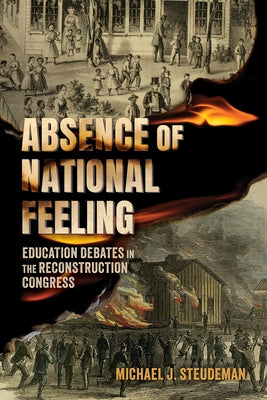University Press of Mississippi
Absence of National Feeling: Education Debates in the Reconstruction Congress
Absence of National Feeling: Education Debates in the Reconstruction Congress
Regular price
$99.00
Regular price
Sale price
$99.00
Unit price
per
Shipping calculated at checkout.
Couldn't load pickup availability
Before the start of the Civil War, the US Congress seldom took up the question of education, deferring regularly to a tradition of local control. In the period after the war, however, education became a major concern of the federal government. Many members of Congress espoused the necessity of schooling to transform southern culture and behavior, secure civil rights, and reconstruct the Union. Absence of National Feeling: Education Debates in the Reconstruction Congress analyzes how policymakers cultivated a rhetoric of public education to negotiate conflicts over federalism and civic belonging in the aftermath of the Civil War. Reconstruction Era advocates embraced education as a way to orchestrate the affective life of Americans. They believed education could marshal feelings of hope, love, shame, and pride to alter Americans' predispositions toward other citizens. The most assertive educational advocates believed that schools would physically bring together children divided by race or religion, fostering shared affinities and dissolving racial hierarchies. Schooling promised to be an emotional adhesive, holding together the North and South and facilitating US expansion into the West. Through protracted debates over national education funding, the fate of the Freedmen's Bureau, and school desegregation, members of Congress negotiated schools' potential as a vehicle for social change. By Reconstruction's end, most members of Congress accepted schooling as an element of national reconciliation. To reach this tenuous consensus, though, legislators sacrificed their call for schools to intervene in the feelings of prejudice, resentment, and superiority that sustained the culture of slavery. Rejecting a transformative educational vision, Congress took another tragic step in its abandonment of Reconstruction. Focusing on the words spoken in the Reconstruction Congress, Absence of National Feeling contends that educational rhetoric appealed to legislators debating whether the federal government could, or even should, alter public feeling. Tracing congressional transcripts between 1865 and 1877, author Michael J. Steudeman illustrates that these debates lastingly helped to both define and delimit the possible trajectories of education policy.
Author: Michael J. Steudeman
Binding Type: Hardcover
Publisher: University Press of Mississippi
Published: 08/04/2025
Series: Race, Rhetoric, and Media
Pages: 211
Weight: 1.06lbs
Size: 9.00h x 6.00w x 0.69d
ISBN: 9781496858467
Author: Michael J. Steudeman
Binding Type: Hardcover
Publisher: University Press of Mississippi
Published: 08/04/2025
Series: Race, Rhetoric, and Media
Pages: 211
Weight: 1.06lbs
Size: 9.00h x 6.00w x 0.69d
ISBN: 9781496858467


